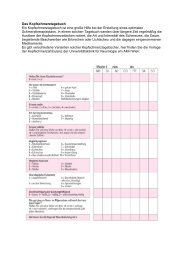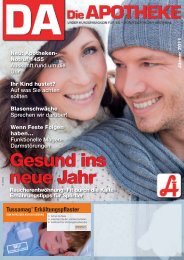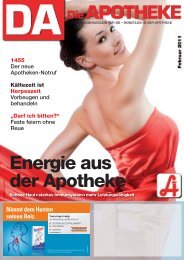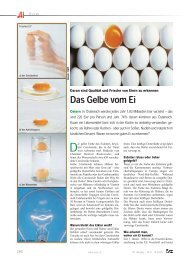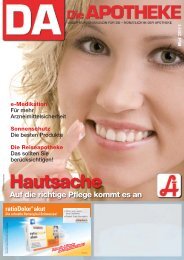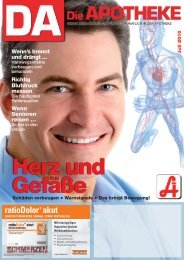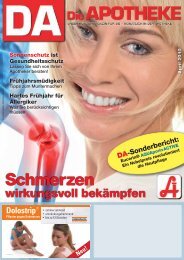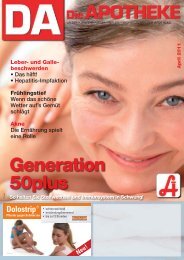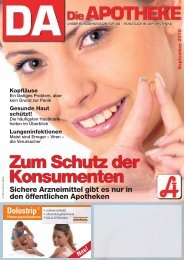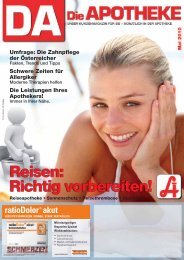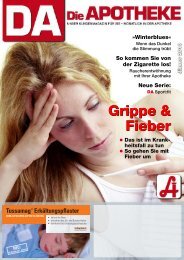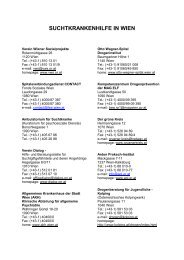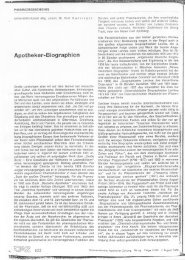The new england journal of medicine
The new england journal of medicine
The new england journal of medicine
Create successful ePaper yourself
Turn your PDF publications into a flip-book with our unique Google optimized e-Paper software.
BDT, 1988<br />
PHS, 1989<br />
TPT, 1998<br />
HOT, 1998<br />
low-dose aspirin and cardiovascular disease in women<br />
Trial Relative Risk <strong>of</strong> Myocardial Infarction<br />
among Men<br />
PPP, 2001<br />
RR=0.68 (0.54–0.86)<br />
P=0.001<br />
Combined<br />
0.2 0.5 1.0 2.0 5.0<br />
Aspirin Better Placebo Better<br />
HOT, 1998<br />
PPP, 2001<br />
WHS, 2005<br />
Trial Relative Risk <strong>of</strong> Myocardial Infarction<br />
among Women<br />
RR=0.99 (0.83–1.19)<br />
P=0.95<br />
Combined<br />
0.2 0.5 1.0 2.0 5.0<br />
Aspirin Better Placebo Better<br />
Figure 3. Aspirin in the Primary Prevention <strong>of</strong> Myocardial Infarction and Stroke among Men and Women.<br />
<strong>The</strong> results <strong>of</strong> a sex-specific random-effects meta-analysis <strong>of</strong> data from six trials are shown: the British Doctors’ Trial<br />
(BDT), the Physicians’ Health Study (PHS), the Thrombosis Prevention Trial (TPT), the Hypertension Optimal Treatment<br />
(HOT) study, the Primary Prevention Project (PPP), and the current Women’s Health Study (WHS). <strong>The</strong> relative risk (RR)<br />
and 95 percent confidence interval (in parentheses) are shown for each trial (indicated by the box and horizontal line<br />
through each box, respectively), and the relative risk is shown for the combined results (indicated by the diamond and<br />
the dashed line in each graph). For the relative risk <strong>of</strong> myocardial infarction among women, the dashed line is coincident<br />
with the solid line at 1.00. <strong>The</strong> size <strong>of</strong> the box is proportional to the amount <strong>of</strong> information in the corresponding trial.<br />
diovascular causes (P=0.008) but to 16 more gastrointestinal<br />
hemorrhages requiring transfusion<br />
(P=0.05), emphasizing, as with any agent, the importance<br />
<strong>of</strong> balancing benefits and risks. This agebased<br />
difference deserves further investigation.<br />
With respect to guidelines in primary prevention,<br />
in 2002, the Preventive Services Task Force24<br />
and the American Heart Association<br />
9<br />
recommend-<br />
ed aspirin for adults whose 10-year risks <strong>of</strong> a first<br />
coronary-heart-disease event were at least 6 percent<br />
and 10 percent, respectively. However, this may be<br />
complex for women, since in our study overall, aspirin<br />
lowered the risk <strong>of</strong> stroke without affecting<br />
the risk <strong>of</strong> myocardial infarction or death from cardiovascular<br />
causes. Thus, as with men, any decision<br />
about the use <strong>of</strong> aspirin in primary prevention<br />
n engl j med 352;13<br />
BDT, 1988<br />
PHS, 1989<br />
TPT, 1998<br />
HOT, 1998<br />
PPP, 2001<br />
Combined<br />
HOT, 1998<br />
PPP, 2001<br />
WHS, 2005<br />
Combined<br />
Trial Relative Risk <strong>of</strong> Stroke among Men<br />
RR=1.13 (0.96–1.33)<br />
P=0.15<br />
among women must ultimately be made after a<br />
woman consults her physician or health care provider,<br />
so that the net absolute benefits and risks for<br />
the individual patient can be ascertained.<br />
Supported by grants (HL-43851 and CA-47988) from the National<br />
Heart, Lung, and Blood Institute and the National Cancer Institute,<br />
Bethesda, Md. Aspirin and aspirin placebo were provided by<br />
Bayer HealthCare. Vitamin E and vitamin E placebo were provided<br />
by the Natural Source Vitamin E Association.<br />
Dr. Ridker reports having received grant support from Bayer. Dr.<br />
Cook reports having served as a consultant to Bayer. Dr. Gaziano reports<br />
having served as a consultant to, and receiving grant support<br />
from, Bayer and McNeil. Dr. Hennekens reports having served as a<br />
consultant to Bayer and McNeil and receiving grant support from<br />
Bayer.<br />
We are indebted to the 39,876 participants in the Women’s Health<br />
Study for their dedicated and conscientious collaboration; to the entire<br />
staff <strong>of</strong> the Women’s Health Study, under the leadership <strong>of</strong> David<br />
Gordon, Maria Andrade, Susan Burt, Mary Breen, Marilyn Chown,<br />
www.nejm.org march 31, 2005<br />
0.2 0.5 1.0 2.0 5.0<br />
Aspirin Better Placebo Better<br />
Trial Relative Risk <strong>of</strong> Stroke among Women<br />
RR=0.81 (0.69–0.96)<br />
P=0.01<br />
0.2 0.5 1.0 2.0 5.0<br />
Aspirin Better Placebo Better<br />
Downloaded from www.nejm.org on March 8, 2005 . For personal use only. No other uses without permission.<br />
Copyright © 2005 Massachusetts Medical Society. All rights reserved.<br />
ridker-11



